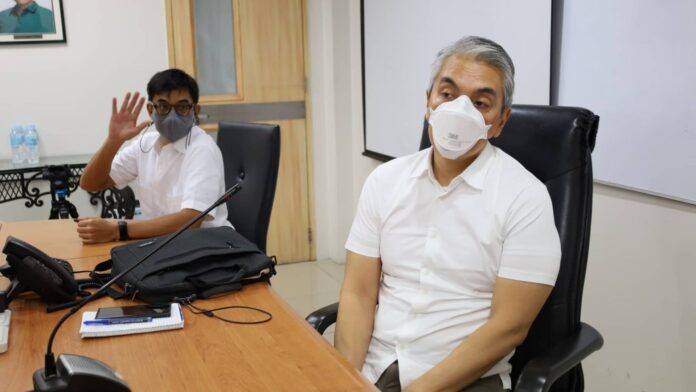Chaired by Navotas Representative Toby M. Tiangco, the House Committee on Information and Communications Technology approved a consolidated measure involving the required registration of postpaid and prepaid mobile subscriber identity module (SIM) cards this Monday.
The house panel agreed upon multiple measures under House Bill (HB) No. 14 authored by Speaker Martin G. Romualdez, Ilocos 1st District Representative Ferdinand Alexander Marcos, and Tingog Partylist Representatives Yedda Marie Romualdez and Jude Acidre to mandate SIM card registration to combat scams and illegal activities surrounding prepaid and postpaid cards.
Tiangco said House Bill No. 14, filed by Speaker Romualdez, will serve as the “mother bill” with it being approved during the third and final reading of the previous 18th Congress.
Deputy Speaker and Pampanga Representative Aurelio “Dong” Gonzales worked for the consolidation of the measures involving SIM card registration.
Albay Representative Joey Sarte Salceda immediately approved the consolidated bill by invoking Rule 10, Section 48 of the House. The said Rule, permits the House committee to dispose of priority measures if the bills or resolutions already passed the third reading of the preceding Congress.
One of the principal authors of HB No.14, Jude Acidre, said unregulated circulation of SIM
Cards in the market has been a major element in mobile phone scams, from simple text message scams up to more concerning voice phishing methods, and marketing spams that may illegally access critical information from subscribers.
“This humble representation is cognizant of the value of democratizing mobile communication to the public. The increase in connectivity through affordable SIM cards and mobile phones has made government service delivery more efficient and possible in the far flung areas of the country. However, we are also conscious of the fact that the accessibility of SIM cards has encouraged unscrupulous actors to take advantage and use this in the commission of criminal acts,” Acidre said in his sponsorship speech.
“With this in mind, Speaker Ferdinand Martin Romualdez, Congresswoman Yedda Romualdez, Ferdinand Alexander Marcos and myself are pleased to introduce HB No. 14 or An Act Requiring the Registration of Subscriber Identity Module Cards.This proposed bill shall require ownership registration of Subscriber Identity Module cards to eradicate mobile phone-aided criminal activities. Moreover, it shall regulate the sale and distribution of SIM cards in order to promote end-user accountability, prevent the proliferation of mobile phone scams and
data breaches, and to assist law enforcement agencies in resolving crimes involving the use of mobile phone units, within the limits imposed by data privacy laws and regulations. It is in this spirit that I ask my fellow members of this chamber to work with me in securing the immediate passage of this bill,” he added.
At the time, only postpaid SIM cards from telecommunication subscriptions are required to be registered. However, the said bill seeks that all SIM cards are required to be registered for ownership.
Along with Acidre, Speaker Romualdez, Representative Romualdez, and Marcos claims that the accessibility of SIM cards “have resulted in the democratization of mobile communications, possibly contributing to a more leveled playing field in terms of employment, education and access to public information.”
They added that the data collected by the World Bank in 2020 showed that 137 cell phone subscriptions are registered per 100 Filipinos, presenting that a portion of Filipino subscribers are using more than one SIM or mobile phone. Additionally, they said that SIM cards can be bought for as low as P30 in accessible sari-sari or convenience stores.
Despite the reports of telecommunication companies that they blocked millions of text messages and SIM cards, scammers could easily replace disabled cards due to its availability. With it, tracing the people behind the scams is nearly impossible. They then stressed that the time “has come to regulate the sale and distribution of SIM cards in order to promote end-user accountability, prevent the proliferation of mobile phone scams and data breaches, and to assist law enforcement agencies in resolving crimes involving the use of mobile phone units.”
With HB No. 14, all public telecommunications entity (PTE) or legitimate sellers will now require end users and subscribers to sign in a triplicate registration form issued to consumers.
The form will require subscribers’ legal information such as name, date of birth, gender, and address registered in their valid ID with photo and the assigned mobile and serial number. It will also serve as a certification that the person buying the card is the same person that will fill the document and the one who presented the valid IDs.
The transaction will not be able to continue if the subscriber refuses to follow the registration requirement, and it also applies to foreigners.
These PTEs are required to track subscriber registry and must provide a list of authorized sellers/agents and submit them to the National Telecommunications Commission.
SIM cards that are active before the effectivity of the proposed SIM Card Registration act will be required to be registered.
In terms of legal use, any information filed in the document shall be treated highly confidential, unless granted by the subscriber, ordered by a court, or written by a law enforcement agency upon investigation of unlawful act involving the number.
The proposed act lists the following penalties:
If committed by a PTE, the president and involving officers shall be held liable and fined up to P300,000 for the first offense, up to P500,000 for a second, and up to P1 million for the third and succeeding violations.
If committed by an authorized seller, immediate operation termination will be sanctioned and a fine of P5,000 up to P50,000.
If committed by an officer or employee of an overseeing agency, they will be removed from service and fined, without prejudiced to the filing of appropriate criminal, civil and administrative charges.
Photo credit: facebook.com/TiangcoToby


